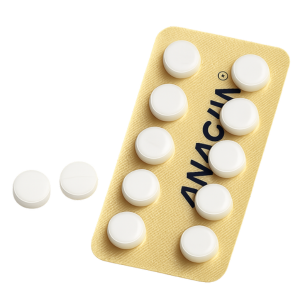
Anacin
Caffeine
32 mg
Note: Caffeine amounts are based on standard Anacin Regular and Maximum Strength tablets. Each contains 32 mg of caffeine regardless of aspirin dosage.
| Attribute | Value |
|---|---|
| Caffeine Level | Low |
| Serving Size | 1 tablet |
| Serving Size (mg) | 432 mg (tablet weight varies) |
| Total Caffeine (per tablet) | 32 mg |
| Caffeine per 2 tabs | 64 mg (similar to a small cup of coffee) |
| Calories | 0 |
| Sugar | 0 g |
Anacin is a long‑standing over‑the‑counter pain reliever that combines aspirin with caffeine. This pairing is designed to deliver faster and more effective relief for headaches, muscle aches, and other common pains.
What Is Anacin? Overview of the Pain Reliever
Anacin is a branded analgesic that has been available in the United States for over a century. It is classified as a combination pain reliever because it blends aspirin, a nonsteroidal anti‑inflammatory drug (NSAID), with caffeine, a central nervous system stimulant.
Key features of Anacin include:
- Active Ingredients – Aspirin (400–500 mg per tablet, depending on strength) and caffeine (32 mg per tablet).
- Primary Uses – Relief of headaches, muscle aches, minor arthritis pain, toothaches, menstrual cramps, and cold‑related body aches.
- OTC Availability – Sold without a prescription in most pharmacies.
- Formulations – Regular Strength (400 mg aspirin + 32 mg caffeine) and Maximum Strength (500 mg aspirin + 32 mg caffeine).
- Manufacturer – Currently produced by Prestige Consumer Healthcare.
Together, these ingredients make Anacin a fast‑acting option for people seeking relief from everyday pain, particularly tension headaches.
How Much Caffeine Is in Anacin?
Yes, Anacin does contain caffeine. Each tablet provides a modest amount, comparable to a small serving of coffee.
Caffeine content per tablet:
- Anacin Regular Strength – 400 mg aspirin + 32 mg caffeine
- Anacin Maximum Strength – 500 mg aspirin + 32 mg caffeine
- Comparison – A typical 8‑oz cup of coffee contains about 95 mg of caffeine, so one Anacin tablet has roughly one‑third that amount.
This means that taking two tablets (the common adult dose) delivers about 64 mg of caffeine, similar to a small cup of coffee.
Why Caffeine Is Added to Pain Relievers
Caffeine is not just a stimulant—it also enhances the effectiveness of pain medications. Research shows that combining caffeine with analgesics like aspirin or acetaminophen can improve pain relief for certain conditions.
Reasons caffeine is included in pain relievers:
- Boosts Absorption – Helps the body absorb aspirin more quickly.
- Enhances Effectiveness – Increases the pain‑relieving power of aspirin.
- Vasoconstriction – Narrows blood vessels, which can reduce headache pain, especially in migraines.
- Improves Alertness – Counters drowsiness that sometimes accompanies pain or medication use.
- Proven Synergy – Clinical studies show better outcomes when caffeine is paired with analgesics.
This makes caffeine a valuable “adjuvant” ingredient, especially for tension and migraine headaches.
Benefits of Caffeine in Anacin
The caffeine in Anacin is not just incidental—it provides measurable benefits when combined with aspirin.
Key benefits include:
- Faster Relief – Pain relief may begin sooner compared to aspirin alone.
- Greater Effectiveness – More people report meaningful pain reduction when caffeine is included.
- Headache Relief – Especially effective for tension headaches and some migraines.
- Mild Energy Boost – Helps reduce fatigue that often accompanies pain.
- Lower Required Dose – May allow effective relief with fewer tablets compared to aspirin alone.
These benefits explain why caffeine remains a common additive in many over‑the‑counter headache medications.
Possible Side Effects of Anacin’s Caffeine Content
While caffeine enhances pain relief, it can also cause side effects, especially in sensitive individuals or when combined with other caffeine sources.
Potential side effects include:
- Nervousness or Jitters – Common with higher caffeine intake.
- Insomnia – More likely if taken late in the day.
- Rapid Heartbeat – Palpitations or increased heart rate in some users.
- Stomach Upset – Especially when combined with aspirin’s gastrointestinal effects.
- Dependence or Withdrawal – Regular use may lead to caffeine withdrawal headaches if stopped suddenly.
Most people tolerate the caffeine in Anacin well, but those sensitive to stimulants should monitor their total daily caffeine intake.
Who Should Avoid Caffeine-Containing Pain Relievers
Not everyone is a good candidate for medications like Anacin. Certain health conditions and medications can make caffeine‑containing pain relievers risky.
Groups who should avoid or limit Anacin include:
- Children and Teens – Aspirin products carry a risk of Reye’s syndrome.
- Pregnant Women – Aspirin and caffeine may pose risks during pregnancy.
- People with Ulcers or GI Bleeding – Aspirin increases bleeding risk.
- Individuals with Heart Conditions – Caffeine may worsen palpitations or high blood pressure.
- Those on Blood Thinners – Aspirin combined with anticoagulants raises bleeding risk.
- Caffeine‑Sensitive Individuals – May experience insomnia, anxiety, or rapid heartbeat.
For these groups, alternative pain relievers without caffeine (such as acetaminophen or ibuprofen) may be safer options.
